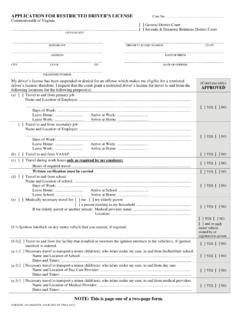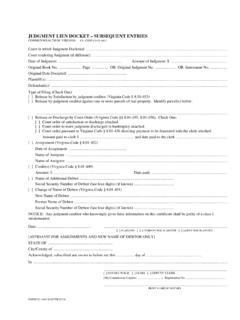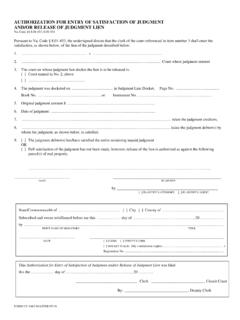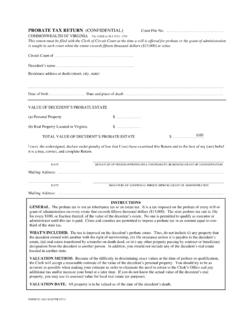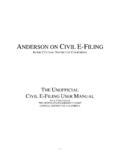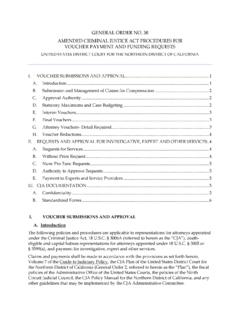Transcription of CHAPTER 4 - BAIL PROCEDURES I. INTRODUCTION
1 magistrate manual bail PROCEDURES PAGE 4-1 Office of the Executive Secretary Department of magistrate Services Rev: 7/18 CHAPTER 4 - bail PROCEDURES I. INTRODUCTION The Constitutions of the United States and of Virginia do not guarantee a defendant the right to bail in criminal cases. The only mention of bail in the Constitution of the United States occurs in Amendment VIII: Excessive bail shall not be required, nor excessive fines imposed, nor cruel and unusual punishments inflicted. Likewise, Article I, Section 9 of the Constitution of Virginia provides: That excessive bail ought not to be required, nor excessive fines imposed, nor cruel and unusual punishments inflicted; that the privilege of the writ of habeas corpus shall not be suspended unless when, in cases of invasion or rebellion, the public safety may require; and that the General Assembly shall not pass any bill of attainder, or any ex post facto law.
2 For many years, the philosophy of bail as set forth in the United States Supreme Court case Stack v. Boyles, 342 1 (1951) guided the judiciary in Virginia in bail determination. In that case, the United States Supreme Court opinion stated: The practice of admission to not a device for keeping persons in jail upon mere accusations until it is found convenient to give them a trial. On the contrary, the spirit of the procedure is to enable them to stay out of jail until a trial has found them guilty. The bail statutes have historically allowed judicial officers to hold a defendant without bail where the defendant posed a flight risk or a danger to the public. In 1996, the General Assembly amended the bail statutes, and included for the first time the presumption that defendants charged with certain felonies, and under certain circumstances pose both a flight risk and a danger to public safety.
3 Consequently, the statutes required that the judicial officer hold such a defendant without bail unless the defendant could successfully rebut that presumption. The General Assembly again amended the bail statutes in 1999, and greatly expanded the situations under which the judicial officer must apply the presumption. The 2000 session of the General Assembly imposed further restrictions on the judicial officer's discretion in bail hearings with an amendment to Va. Code This amendment requires judicial officers to impose secure bonds as a condition of release under certain circumstances in felony cases. Consequently, Virginia law has thus restricted the basic premise set forth in Stack, to cases in which the defendant does not pose a flight risk or a threat to public safety, cases not falling within the statutory presumptions found in Va. Code and , cases not requiring a secure bond as provided for in Va.
4 Code , and to those cases not covered by the narrow no- bail requirement of Va. Code With the exception of the restrictions noted in Va. Code , , , , and , a magistrate has discretion in deciding the issue of bail . In other words, the Code of Virginia does not impose a scale of dollar amounts tied to specific magistrate manual bail PROCEDURES PAGE 4-2 Office of the Executive Secretary Department of magistrate Services Rev: 7/18 crimes. A magistrate may determine that conditions of release are not necessary and can release the defendant upon the defendant's written agreement to appear in court on a specific date and time. Should the magistrate determine that a bond is necessary, the magistrate sets the amount of bond and determines whether the bond is secured or unsecured by reviewing facts gathered in the bail hearing. The magistrate 's bail decision is unique to each individual case.
5 A bail hearing is a judicial proceeding. The magistrate must hold the bail hearing in the presence of the accused to afford him or her due process under the law by providing an opportunity to ask questions and, of course, to answer those asked by the magistrate . No statute authorizes the magistrate to conduct a bail hearing over the telephone. Virginia Code , however, does permit the magistrate to conduct a bail hearing through the use of a two- way electronic videoconference system. Regardless of the time of day or night, due process guarantees the defendant the right to appear before a magistrate for a bail hearing either in person or through a videoconference system. Although not specifically required by statute, the magistrate needs to administer an oath to the defendant and all others presenting testimony, prior to conducting a bail hearing.
6 When the magistrate conducts the bail hearing under oath, the defendant is subject to a perjury prosecution for any false statements knowingly made in the hearing. Nothing in the Code of Virginia addresses the confidentiality of bail hearings. On occasion, the defendant's attorney or the Commonwealth s attorney may request to be present during the bail hearing. If the attorney is present when the magistrate is ready to conduct the hearing, the magistrate must admit the attorney to the hearing. The magistrate is under no obligation, however, to delay a bail hearing until an attorney arrives. At times, the magistrate may receive requests from the media or general public to attend bail hearings. A recent decision from a federal court suggests that the magistrate should admit such people to the bail hearing upon receiving such a request. A magistrate , however, does not have to delay a hearing until the interested party arrives.
7 II. THE bail HEARING REQUIREMENT Virginia Code , , , , , , and direct when a person must be brought before a judicial officer for a bail determination. There is a basic premise that runs throughout all of these statutes. That being, once an authorized officer has arrested an accused upon probable cause, or executed a warrant of arrest or capias, the officer must bring the accused forthwith before a judicial officer who then is required to conduct a bail determination hearing. Virginia Code and set forth the PROCEDURES for arrests pursuant to an existing warrant or capias. The last paragraph of Va. Code provides that: Whenever a person is arrested upon a warrant or capias in a county or city other than that in which the charge is to be tried, the law-enforcement officer or jail officer making the arrest shall either (i) bring the accused forthwith before a judicial officer magistrate manual bail PROCEDURES PAGE 4-3 Office of the Executive Secretary Department of magistrate Services Rev: 7/18 in the locality where the arrest was made or where the charge is to be tried or (ii) commit the accused to the custody of an officer from the county or city where the charge is to be tried who shall bring the accused forthwith before a judicial officer in the county or city in which the charge is to be tried.
8 The judicial officer before whom the accused is brought shall immediately conduct a bail hearing and either admit the accused to bail or commit him to jail for transfer forthwith to the county or city where the charge is to be tried. (Emphasis added) The language of this statute authorizes the arresting officer to either take the accused before the magistrate in the locality where the arrest occurred, or to transfer custody of the accused to a law enforcement officer of the locality where the accused will be tried. This decision as to which locality's magistrate will conduct the bail hearing rests solely with the arresting officer. Pursuant to Va. Code , a magistrate has the authority to admit to bail a juvenile taken into custody pursuant to Va. Code or an adult defendant, who is held in the magistrate 's judicial district under charges originating from another district.
9 Should a law-enforcement officer or jail officer bring the defendant before the magistrate pursuant to Va. Code , the magistrate must conduct the bail hearing. If the defendant were able to meet the conditions of release, the magistrate would prepare the DC-330, RECOGNIZANCE returnable to the court having trial authority over the underlying case. If the accused is unable to meet the conditions of bail , the magistrate will prepare a DC-352, COMMITMENT ORDER. At some later time, a law enforcement officer for the locality having trial authority will transport the defendant back to that locality. Since the defendant has already had a bail hearing, the accused will not appear before the magistrate once he or she arrives at the jail serving the locality having trial authority. The accused's next judicial proceeding will be an arraignment before a court.
10 The language of Va. Code pertinent to bail PROCEDURES for magistrates states: In any case in which an officer does not issue a summons pursuant to or , a law-enforcement officer making an arrest under a warrant or capias shall bring the arrested person without unnecessary delay before a judicial officer. The judicial officer shall immediately conduct a bail hearing and either admit the accused to bail or commit him to jail. (Emphasis added) Virginia Code sets forth arrest PROCEDURES applicable when a law enforcement officer arrests a person without a warrant. This statute directs that: If a warrant is issued the case shall thereafter be disposed of .. under the provisions of through , if the issuing officer is a magistrate or other issuing officer having jurisdiction. In other words, the statute directs the magistrate to conduct a bail hearing if the magistrate has issued a warrant upon the conclusion of the probable cause hearing.



